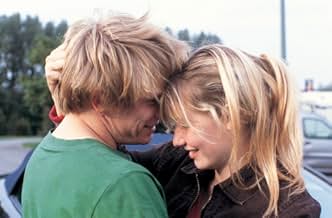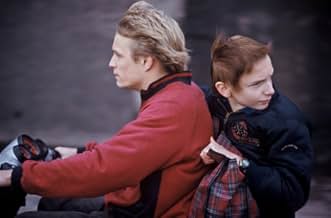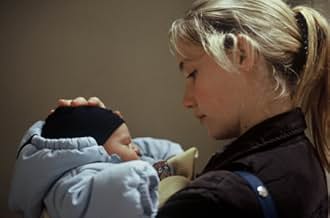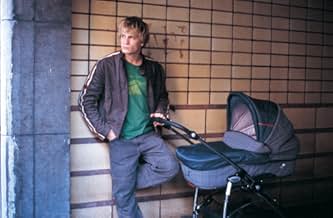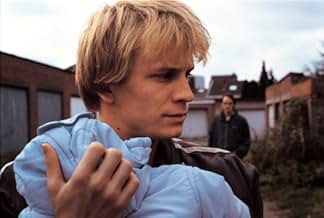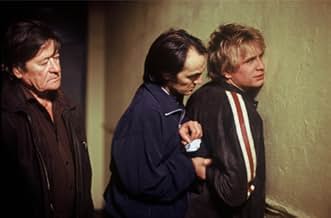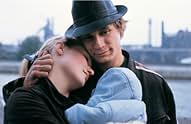L'enfant
- 2005
- Tous publics
- 1h 35m
IMDb RATING
7.4/10
20K
YOUR RATING
Bruno and Sonia, a young couple living off her benefit and the thefts committed by his gang, have a new source of money: their newborn son.Bruno and Sonia, a young couple living off her benefit and the thefts committed by his gang, have a new source of money: their newborn son.Bruno and Sonia, a young couple living off her benefit and the thefts committed by his gang, have a new source of money: their newborn son.
- Directors
- Writers
- Stars
- Awards
- 14 wins & 21 nominations total
Anne Gerard
- Commerçante
- (as Anne Gérard)
Leon Michaux
- Policier Commissariat
- (as Léon Michaux)
- Directors
- Writers
- All cast & crew
- Production, box office & more at IMDbPro
Featured reviews
Bruno (Jérémie Renier, magnificent) and Sonia (Déborah François, who reminds me of a younger Julie Delpy) are immature, teen lovers. They live on the streets of Seraing, Belgium, getting money from Bruno's gang's petty crimes. Sonia gives birth to a baby boy, Jimmy, but Bruno is totally indifferent. He sells his newborn son without Sonia's consent, and she has a nervous breakdown when he tells her what he did. Bruno then goes against all odds to get Jimmy back, but it won't be an easy ride.
"L'Enfant" is a beautiful, raw poetry about children who haven't grown up, and have their own kids without even knowing how to care of themselves. This is a film of silences, gestures that say more than a thousand words. "L'Enfant" is the first film by Luc and Jean-Pierre Dardenne that I've had the opportunity to watch, and I couldn't be more satisfied. After reading great things about some of his other films - "La Promesse" (1996), "Rosetta" (Golden Palm at Cannes 1999), "Le Fils" (2002, Olivier Gourmet was awarded Best Actor at Cannes) -; now I understand why they're considered some of the most talented names making films nowadays. Their honesty and strength to tell this poignant story, which could easily become an absurd melodrama, is mindblowing. "L'Enfant" gave the Dardenne brothers a second Golden Palm at Cannes, and hopefully the pompous award will make more people curious to check this work of art. Nothing is as simple as it seems, and as we get into the nightmarish world of Bruno, we see he's not only an immature, cruel lad who sold his own kid, but someone who hasn't even begun to live.
Sad and remarkable, "L'Enfant" has some similarities with Hector Babenco's classic "Pixote - A Lei do Mais Fraco" (1981) and is certainly one of the year's best. 10 out of 10.
"L'Enfant" is a beautiful, raw poetry about children who haven't grown up, and have their own kids without even knowing how to care of themselves. This is a film of silences, gestures that say more than a thousand words. "L'Enfant" is the first film by Luc and Jean-Pierre Dardenne that I've had the opportunity to watch, and I couldn't be more satisfied. After reading great things about some of his other films - "La Promesse" (1996), "Rosetta" (Golden Palm at Cannes 1999), "Le Fils" (2002, Olivier Gourmet was awarded Best Actor at Cannes) -; now I understand why they're considered some of the most talented names making films nowadays. Their honesty and strength to tell this poignant story, which could easily become an absurd melodrama, is mindblowing. "L'Enfant" gave the Dardenne brothers a second Golden Palm at Cannes, and hopefully the pompous award will make more people curious to check this work of art. Nothing is as simple as it seems, and as we get into the nightmarish world of Bruno, we see he's not only an immature, cruel lad who sold his own kid, but someone who hasn't even begun to live.
Sad and remarkable, "L'Enfant" has some similarities with Hector Babenco's classic "Pixote - A Lei do Mais Fraco" (1981) and is certainly one of the year's best. 10 out of 10.
Although I have not seen all other Cannes' comp. films, I think this is a worthy winner of the Palm d'or. The film's scenery is gray Seraing, like the previous Dardenne films, and I think this is the first film in which the camera-work complements the scenery and story near perfectly. Scene's often contain only one or two shots, cutting right when everything has been said. Its one of the few films where I did not notice the camera (I'm a student cameraman), which should be the goal of every cameraman, at least in this style of film. The acting is very impressive (especially Jeremie Renier as Bruno), like previous Dardenne Films. The film seems the most accessible Dardenne so far, although it does not bore in simplicity (I saw it twice in one week, avant-premiere and sneak preview, and I liked the second time best).
L'Infant is extraordinary surprising. I never had seen a Belgian movie so I was very curious about this when I was in the theater.
The script is about 2 young youths that aren't yet mature already carrying the burden of taking care of their own baby. Unemployed, without any good prospect of a real future, school droppers and not having reached maturity, they went on living just for the moment. The father is just a young, dull and irresponsible teenager that lives thru schemes and small petty crimes. The mother, looking as a 12 years old girl, thrives to support the child and don't discourage the way of living of her "husband", seen by her as fair and needed to aid their life.
The film focuses also on the illegal and dark commerce of adoption and selling of children, which is by the way what the boy will do to gain a load of money...
The movie then runs to decadence, regret, awareness of childish mistakes and bad options that, without surprise, would lead to an expected nightmare... jail.
Great acting, fair dialog(Due to the content of the story) and a voyage to the sorrow for the misfortunes of these 2 child-parents.
The script is about 2 young youths that aren't yet mature already carrying the burden of taking care of their own baby. Unemployed, without any good prospect of a real future, school droppers and not having reached maturity, they went on living just for the moment. The father is just a young, dull and irresponsible teenager that lives thru schemes and small petty crimes. The mother, looking as a 12 years old girl, thrives to support the child and don't discourage the way of living of her "husband", seen by her as fair and needed to aid their life.
The film focuses also on the illegal and dark commerce of adoption and selling of children, which is by the way what the boy will do to gain a load of money...
The movie then runs to decadence, regret, awareness of childish mistakes and bad options that, without surprise, would lead to an expected nightmare... jail.
Great acting, fair dialog(Due to the content of the story) and a voyage to the sorrow for the misfortunes of these 2 child-parents.
I had the fortune to go see this at its Belgian premiere, which was attended by the main, and stunningly beautiful female actress, Déborah François. I found myself to be interested in the story from the start. The beginning of the film starts very simply, a young mother with a new-born baby searching on the street for what the audience presumes at the time, and is later verified to be the father of her child. The storyline then develops more as a sketch of the day-to-day living at the bottom of Belgian society. Though despite the fact a grim picture of the central couple's living situation is presented, the film-maker has not crossed the line and has interlaced many light-hearted moments into the movie.
The story develops as Bruno, the baby's father, is quickly shown to have no real interest in the baby or fatherhood, just in making money. He also is portrayed to have a genuine love for Sonya. In this sense the audience follows Brunos life, knowing not whether to cheer him or pray for his downfall, after he makes several questionable choices about the fate of his baby.
I recommend this film to anyone who enjoys a simple film without Hollywood special effects, planned cinematography or any sort of soundtrack. I can see its appeal, but personally I came away wondering what exactly the director was trying to prove by making this film. He did succeed,however, to provide a somewhat entertaining, if slightly heavy film. The cast are excellent.
The story develops as Bruno, the baby's father, is quickly shown to have no real interest in the baby or fatherhood, just in making money. He also is portrayed to have a genuine love for Sonya. In this sense the audience follows Brunos life, knowing not whether to cheer him or pray for his downfall, after he makes several questionable choices about the fate of his baby.
I recommend this film to anyone who enjoys a simple film without Hollywood special effects, planned cinematography or any sort of soundtrack. I can see its appeal, but personally I came away wondering what exactly the director was trying to prove by making this film. He did succeed,however, to provide a somewhat entertaining, if slightly heavy film. The cast are excellent.
L'infant belongs to Sophie and Bruno, both feckless, petty criminals, in a seedy Belgian city. She has just come out of prison (?)with the newborn. She goes to their apartment but finds that Bruno has sublet the place to a bilious couple, so she has to track Bruno down at work trying to cadge small change from passers by. He is pleased to see her but diffident towards his son: Jimmy.
They spend the night in a shelter, or rather she does, as he cuts his time short to fence his stolen goods to a woman who drops a hint that if they're not up to raising a child they could adopt it out for a good price.
After showing us how they can only seem to communicate through adolescent rough housing, we are left with the distinct impression that they are too immature for parenthood. A few days later, while they wait in line, Bruno offers to walk the baby. He then sells it to a baby selling gang, and returns to show Sophie the wad of cash. Sophie passes out from shock.
We see not one wit of shame or guilt from Bruno up to this point. He is, we presume, an amoral street thug, out for how to make the next buck, and found the baby to good an opportunity to pass up for a sizable reward. Besides, given the empty life the baby will be looking forward to, the adoption by a better off couple doesn't seem to be bad for the child.
Sophie passing out seems to bring him to his senses. Is he remorseful? Does he love her? Up to this point all we have seen of their relationship is one of two vapid adolescent children, with no hint of any plans to make a future for their off-spring.
He carries her to a hospital and starts calling his go between to have the deal undone. At this point his motivation is left deliberately unclear. Is he doing so because he regrets his actions and needs to make it up to Sophie, or is he doing it because her accusations are over heard by the staff and the police will soon be carting him off to jail? In any event he manages to get the child back, giving up the E5,000 without a whimper, but then faces the angry brokers who are now out their E5,000. When he returns to the hospital with the baby the police are there and he makes up the story that he was just pretending to sell the child as revenge for her infidelity, and then calmly disowns the child as his.
Sophie refuses to talk with him and the police have to back off, and at this point in the movie we are no clearer to discerning any hint of empathy stirring in Bruno's pock marked face. I felt sorry for Sophie in her realization that her lover is as calloused as his feet, but presumed she would soon allow him back into her life. Yet as morally revolted as I was by Bruno, I still wanted to see if he could manage some kind of redemption.
The movie ends in leaving us to answer that question ourselves.
The crux of the movie is Bruno's character, or lack of it. He is no sociopath; he is not evil; his bland personality is as banal and unattractive as cold soup. He seems to not be dangerous, until faced with too much temptation to his greed. Yet he is difficult to hate. He is like that black sheep relative we all have and shake our heads about, so that we can whistle past the graveyard of our own inadequacies. He is what humanity can become when the spirit slumbers. He is society's unwitting sin eater.
They spend the night in a shelter, or rather she does, as he cuts his time short to fence his stolen goods to a woman who drops a hint that if they're not up to raising a child they could adopt it out for a good price.
After showing us how they can only seem to communicate through adolescent rough housing, we are left with the distinct impression that they are too immature for parenthood. A few days later, while they wait in line, Bruno offers to walk the baby. He then sells it to a baby selling gang, and returns to show Sophie the wad of cash. Sophie passes out from shock.
We see not one wit of shame or guilt from Bruno up to this point. He is, we presume, an amoral street thug, out for how to make the next buck, and found the baby to good an opportunity to pass up for a sizable reward. Besides, given the empty life the baby will be looking forward to, the adoption by a better off couple doesn't seem to be bad for the child.
Sophie passing out seems to bring him to his senses. Is he remorseful? Does he love her? Up to this point all we have seen of their relationship is one of two vapid adolescent children, with no hint of any plans to make a future for their off-spring.
He carries her to a hospital and starts calling his go between to have the deal undone. At this point his motivation is left deliberately unclear. Is he doing so because he regrets his actions and needs to make it up to Sophie, or is he doing it because her accusations are over heard by the staff and the police will soon be carting him off to jail? In any event he manages to get the child back, giving up the E5,000 without a whimper, but then faces the angry brokers who are now out their E5,000. When he returns to the hospital with the baby the police are there and he makes up the story that he was just pretending to sell the child as revenge for her infidelity, and then calmly disowns the child as his.
Sophie refuses to talk with him and the police have to back off, and at this point in the movie we are no clearer to discerning any hint of empathy stirring in Bruno's pock marked face. I felt sorry for Sophie in her realization that her lover is as calloused as his feet, but presumed she would soon allow him back into her life. Yet as morally revolted as I was by Bruno, I still wanted to see if he could manage some kind of redemption.
The movie ends in leaving us to answer that question ourselves.
The crux of the movie is Bruno's character, or lack of it. He is no sociopath; he is not evil; his bland personality is as banal and unattractive as cold soup. He seems to not be dangerous, until faced with too much temptation to his greed. Yet he is difficult to hate. He is like that black sheep relative we all have and shake our heads about, so that we can whistle past the graveyard of our own inadequacies. He is what humanity can become when the spirit slumbers. He is society's unwitting sin eater.
Did you know
- TriviaJimmy is played by 40 different babies.
- ConnectionsFeatured in Smagsdommerne: Episode #3.17 (2006)
- How long is The Child?Powered by Alexa
Details
- Release date
- Countries of origin
- Official sites
- Language
- Also known as
- The Child
- Filming locations
- Rue de la Banque, Seraing, Liège, Wallonia, Belgium(Sonia's apartment exteriors)
- Production companies
- See more company credits at IMDbPro
Box office
- Budget
- €3,600,000 (estimated)
- Gross US & Canada
- $651,941
- Opening weekend US & Canada
- $44,537
- Mar 26, 2006
- Gross worldwide
- $5,507,396
- Runtime1 hour 35 minutes
- Color
- Sound mix
- Aspect ratio
- 1.66 : 1
Contribute to this page
Suggest an edit or add missing content



